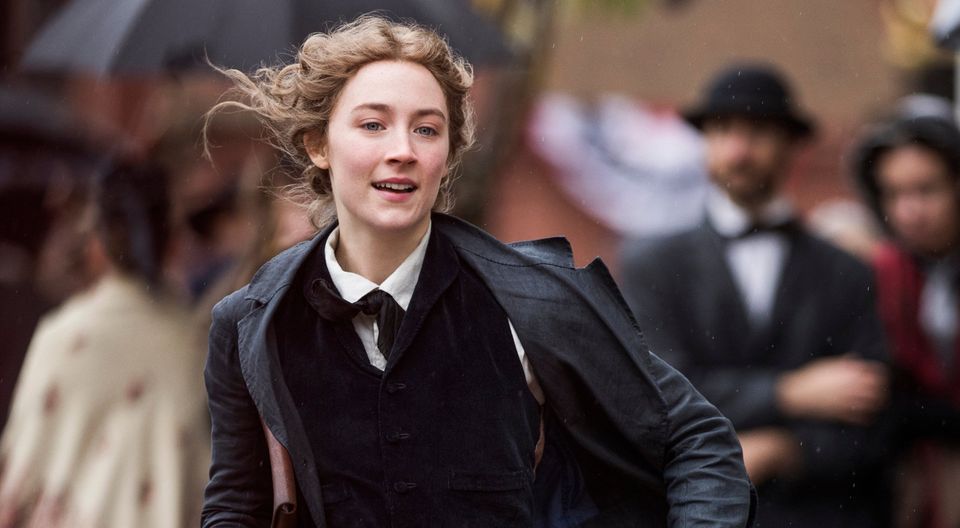Little Women review: Saoirse Ronan and Florence Pugh excel in Greta Gerwig's irresistible adaptation
5 stars
Little Women
In the summer of 1868, at the behest of her publisher, Louisa May Alcott sat down to try and write “a girl’s book”. She wrote fast, but did not relish the process: “I plod away,” she told her diary, “although I don’t enjoy this sort of thing”. The result was Little Women, a moving account of the contrasting fortunes of four sisters who grow up in genteel poverty in rural Massachusetts. People have been reading it, and making films about it, ever since.
Greta Gerwig’s film is by my count the eighth movie adaptation, and some of them have been rather wonderful. I’m very fond of the 1933 George Cukor version, in which a spiky Katharine Hepburn was perfectly cast as the headstrong Jo, and the 1994 Winona Ryde Little Women is pretty much irresistible. The last screen version was released (to stony silence) only a year ago: so the question is, why do we need another one?
Asking that is like asking if anyone needs to put on Hamlet again. Although I don’t mean to compare Little Women to Shakespeare in terms of artistic merit, it does have a timeless universality, a deep insight into the essential human experience that makes it relevant for every generation. It’s also a damned good story, and the hard thing for anyone adapting it is to forget what’s gone before and make the tale their own. Greta Gerwig and her cast achieve that goal splendidly.
Her film is bookended by two meetings with a crusty publisher (nicely played by Tracy Letts). Tight-lipped and furiously determined, Jo March (Saoirse Ronan) has moved to Boston to make her way as a writer, and has come to meet Mr Dashwood to show him her work. Disdainfully, he runs a run pen through half of her story, then says he’ll take it, but tells her she’ll have to dig deeper, and use her own experiences, if she’s to become a real writer. Jo then thinks back to her formative years in rural Massachusetts.
Starring role: Saoirse Ronan got a Golden Globe nomination for her role in ‘Little Women’
With their father away at the Civil War, and their income consequently reduced, the March girls are primly but lovingly raised by their resourceful and ever-smiling mother, Marmie (Laura Dern). Jo, Meg (Emma Watson), Amy (Florence Pugh) and Beth (Eliza Scanlan) are fiercely close but ever jostling, bound together by love but pushed apart by clashing personalities. Meg is thoughtful, quiet, pretty, preoccupied by the search for love; and Beth is gentle, sweet, kind and doomed. But the March household is dominated by the warring egos of Jo and Amy.
We need your consent to load this Social Media content. We use a number of different Social Media outlets to manage extra content that can set cookies on your device and collect data about your activity.
Jo has wanted to be a writer ever since she learned to read: she’s quick and bright and daringly tom-boyish, and Amy is jealous. She likes to paint, and is determined to be noticed, and their rivalry finds a focus in their wealthy dreamboat neighbour, Laurie Lawrence (played with his usual fey insouciance by Timothee Chalamet). Jo’s determination will take her to Boston, while Amy will travel to Paris on the coattails of her rich and grumpy but winningly caustic Aunt March (Meryl Streep) to study painting and look up Laurie, who’s in despair and has hit the absinthe.
His gloom is a consequence of having been turned down by Jo, who regrets it, but fate — and the steady hand of Miss Alcott — will intervene to end things satisfactorily for all.
If you’re going to remake Little Women you’d better do something different with it, and Greta Gerwig’s film tinkers with chronology to move freely back and forth through the sisters’ stories. Meg will meet a good man (James Norton’s John Brooke), but poverty will persist, Amy’s wilfulness will cause all manner of problems, and pig-headed Jo will sometimes be her own worst enemy. All this is done very deftly, and in spite of its dancing storyline Little Women has compelling momentum, a graceful flow. Gerwig’s screenplay manages to be both faithful and modern, though never jarringly so.
The palette is rich, and the shabbiness that haunts the edges of the original stories has been sanitised somewhat. But the ensemble household scenes are wonderfully done, with everyone talking at once and competing for attention except for poor Beth, who seems to have a stubborn cough. There’s plenty of comedy, a Gerwig speciality, but her film doesn’t shy away from deeper emotions.
Saoirse Ronan leads the line with great authority — her Jo is fiercely energetic, but paradoxically shy. Florence Pugh is another huge cinematic talent, and this film would be worth watching for Jo and Amy’s histrionic battle of wills alone. And when Jo returns to her publisher at the end of the film to discuss the publication of a book based on her family, he insists she give the thing a happy ending. With reservations, she agrees.
(PG, 135mins)
Also releasing this week:
Spies in Disguise
3 stars
We need your consent to load this Social Media content. We use a number of different Social Media outlets to manage extra content that can set cookies on your device and collect data about your activity.
A kids’ espionage caper with a mildly amusing premise, this blandly animated Blue Sky cartoon takes its cue from the James Bond films. Lance Sterling (Will Smith) is, by his own reckoning, “the world’s most awesome spy”, a slick and hubristic agent who mops up gangs of international hoodlums without raising a sweat.
But when he’s wrongly accused of stealing a bio-weapon, and teams up with an eccentric young inventor called Walter Beckett (Tom Holland), Lance gets turned into a pigeon. That’s the film’s joke, and it flogs it for all its worth, producing some amusing moments in a busy production that sags in the middle.
(PG, 102mins)
Playing with Fire
2 stars
We need your consent to load this Social Media content. We use a number of different Social Media outlets to manage extra content that can set cookies on your device and collect data about your activity.
Any Fickman’s ham-fisted comedy falls into that rarest of categories, bad films to which I am well disposed. Its ramshackle charm is mainly due to the ever-likeable John Cena, who plays Captain James Carson, the square-jawed leader of a Californian fire-jumping team.
These expert firefighters are lowered by helicopter into the middle of blazes, but their heroic work is disrupted when they rescue three kids from a burning house. After that they can’t get rid of them, and Carson’s well-buried paternal instincts emerge. The jokes are awful, and there’s way too much ensemble mugging, but a heartwarming message almost won me over.
(PG, 96mins)
Long Day’s Journey into Night
5 stars
We need your consent to load this Social Media content. We use a number of different Social Media outlets to manage extra content that can set cookies on your device and collect data about your activity.
Bi Gan’s film shares only a title with Eugene O’Neill’s famous play, and boasts nothing as immovably concrete as a plot. It’s an extraordinary, lyrical journey that appears to be preoccupied with the Proustian themes of memory, perspective and impotent regret.
A man called Luo (Huang Jue), haunted by the events of his youth, wanders the streets of Kaili city looking for clues, and a woman, Wan Qiwen (Tang Wei) who may have been the love of his life. There are touches of Kafka, also of Tarkovsky, to this dream-like and beguilingly non-literal film that concludes with an audacious 3D sequence that explains everything, and nothing.
(No Cert, IFI, 138mins)
Join the Irish Independent WhatsApp channel
Stay up to date with all the latest news















